- Home
- Dennis Lehane
Sacred
Sacred Read online
DENNIS
LEHANE
SACRED
For Sheila
Do not give dogs what is sacred;
do not throw your pearls to pigs.
If you do, they may trample them underfoot,
and then turn and tear you to pieces.
—MATTHEW 7:6
Contents
Epigraph
PART ONE
GRIEF RELEASE
1
A piece of advice: If you ever follow someone in…
2
“Last year,” Trevor Stone said, “my wife was driving back…
3
“Fifty,” Angie said as we rode the subway from Wonderland…
4
Angie looked up from the reports and rubbed her eyes.
5
“Fin de siècle,” Ginny Regan said.
6
“Hello!”
7
The front door of Grief Release, Inc., was black birch…
8
“So they know who you are,” Angie said as we…
9
Richie Colgan claims his ancestors are from Nigeria, but I’m …
10
Four years ago, after a particularly lucrative case involving insurance…
11
“Desiree Stone,” Angie repeated. “Come on, John. We know she…
12
“So my daughter’s in Tampa,” Trevor Stone said.
13
“Who’d you say you’re working for?” Captain Groning said.
14
The offices of Hamlyn and Kohl Worldwide Investigations occupied the…
PART TWO
SOUTH OF THE BORDER
15
I’d never been on a private jet before, so I…
16
Harbor Island looked to be man-made and relatively new. It…
17
No one we talked to at the Courtyard Marriott recognized…
18
To get to Bradenton, we drove 275 south through St. Petersburg…
19
“Jesus, Angie,” Jay said, “last time I saw you, you…
20
For the next few minutes, none of us spoke. We…
21
The Grief Release retreat for Level Fives was held in…
22
“My father,” Desiree told Jay two days later, once they’d…
23
“So, I tracked down Price at a motel just up…
24
The road curved as we broke from a no-man’s-land of…
25
“He going to be okay?” Inspector Jefferson asked the EMT…
26
The skyway bridged two counties. Manatee County, on the southern…
27
My lawyer, Cheswick Hartman, had caught a flight from Boston…
28
At nine that night, we were released.
29
We walked over to Central Avenue and headed north toward…
30
“Nice gun,” I said. “Did you pick it because it…
31
“Hi.”
PART THREE
FAIL-SAFE
32
About a year after I finished my apprenticeship with Jay…
33
“Get up. Come on. Get up.” I threw back the…
34
It was all there to see in black-and-white for anyone…
35
“What’s she gain by coming back here?” Angie said, adjusting…
36
His office had everything the prosperous man needs, save a…
37
We hailed a cab on State Street and rode against…
38
The silence followed me as I drove back to Whittier…
39
My first thought, as I swam back to consciousness, was…
40
Trevor Stone carried himself with as much composure as I’ve…
41
I stood by the shower in the downstairs guest bathroom…
42
We climbed the grand staircase slowly, Trevor leaning on the…
Epilogue
We didn’t hear what had happened until we got back…
Acknowledgments
About the Author
Praise
Other Books by Dennis Lehane
Copyright
About the Publisher
PART ONE
GRIEF RELEASE
1
A piece of advice: If you ever follow someone in my neighborhood, don’t wear pink.
The first day Angie and I picked up the little round guy on our tail, he wore a pink shirt under a gray suit and a black topcoat. The suit was double-breasted, Italian, and too nice for my part of town by several hundred dollars. The topcoat was cashmere. People in my neighborhood could afford cashmere, I suppose, but usually they spend so much on the duct tape that keeps their tail pipes attached to their ’82 Chevys, that they don’t have much left over for anything but that trip to Aruba.
The second day, the little round guy replaced the pink shirt with a more subdued white, lost the cashmere and the Italian suit, but still stuck out like Michael Jackson in a day care center by wearing a hat. Nobody in my neighborhood—or any of Boston’s inner-city neighborhoods that I know of—wears anything on their head but a baseball cap or the occasional tweed Scally. And our friend, the Weeble, as we’d come to call him, wore a bowler. A fine-looking bowler, don’t get me wrong, but a bowler just the same.
“He could be an alien,” Angie said.
I looked out the window of the Avenue Coffee Shop. The Weeble’s head jerked and then he bent to fiddle with his shoelaces.
“An alien,” I said. “From where exactly? France?”
She frowned at me and lathered cream cheese over a bagel so strong with onions my eyes watered just looking at it. “No, stupid. From the future. Didn’t you ever see that old Star Trek where Kirk and Spock ended up on earth in the thirties and were hopelessly out of step?”
“I hate Star Trek.”
“But you’re familiar with the concept.”
I nodded, then yawned. The Weeble studied a telephone pole as if he’d never seen one before. Maybe Angie was right.
“How can you not like Star Trek?” Angie said.
“Easy. I watch it, it annoys me, I turn it off.”
“Even Next Generation?”
“What’s that?” I said.
“When you were born,” she said, “I bet your father held you up to your mother and said, ‘Look, hon, you just gave birth to a beautiful crabby old man.’”
“What’s your point?” I said.
The third day, we decided to have a little fun. When we got up in the morning and left my house, Angie went north and I went south.
And the Weeble followed her.
But Lurch followed me.
I’d never seen Lurch before, and it’s possible I never would have if the Weeble hadn’t given me reason to look for him.
Before we left the house, I’d dug through a box of summer stuff and found a pair of sunglasses I use when the weather’s nice enough to ride my bicycle. The glasses had a small mirror attached to the left side of the frame that could be swung up and out so that you could see behind you. Not quite as cool as the equipment Q gave Bond, but it would do, and I didn’t have to flirt with Ms. Moneypenny to get it.
An eye in the back of my head, and I bet I was the first kid on my block to have one, too.
I saw Lurch when I stopped abruptly at the entrance of Patty’s Pantry for my morning cup of coffee. I stared at the door as if it held a menu and swung the mirror out and rotated my head until I noticed the guy who looked like a mortician on the
other side of the avenue by Pat Jay’s Pharmacy. He stood with his arms crossed over his sparrow’s chest, watching the back of my head openly. Furrows were cut like rivers in his sunken cheeks, and a widow’s peak began halfway up his forehead.
In Patty’s, I swung the mirror back against the frame and ordered my coffee.
“You go blind all a sudden, Patrick?”
I looked up at Johnny Deegan as he poured cream into my coffee. “What?”
“The sunglasses,” he said. “I mean, it’s, what, middle of March and no one’s seen the sun since Thanksgiving. You go blind, or you just trying to look hipper’n shit?”
“Just trying to look hipper’n shit, Johnny.”
He slid my coffee across the counter, took my money.
“It ain’t working,” he said.
Out on the avenue, I stared through my sunglasses at Lurch as he brushed some lint off his knee then bent to tie his shoelaces just like the Weeble had the day before.
I took off my sunglasses, thinking of Johnny Deegan. Bond was cool, sure, but he never had to walk into Patty’s Pantry. Hell, just try and order a vodka martini in this neighborhood. Shaken or stirred, your ass was going out a window.
I crossed the avenue as Lurch concentrated on his shoelace.
“Hi,” I said.
He straightened, looked around as if someone had called his name from down the block.
“Hi,” I said again and offered my hand.
He looked at it, looked down the avenue again.
“Wow,” I said, “you can’t tail someone for shit but at least your social skills are honed to the quick.”
His head turned as slowly as the earth on its axis until his dark pebble eyes met mine. He had to look down to do it, too, the shadow of his skeletal head puddling down my face and spreading across my shoulders. And I’m not a short guy.
“Are we acquainted, sir?” His voice sounded as if it were due back at the coffin any moment.
“Sure, we’re acquainted,” I said. “You’re Lurch.” I looked up and down the avenue. “Where’s Cousin It, Lurch?”
“You’re not nearly as amusing as you think you are, sir.”
I held up my coffee cup. “Wait till I’ve had some caffeine, Lurch. I’m a certified bust-out fifteen minutes from now.”
He smiled down at me and the furrows in his cheeks turned to canyons. “You should be less predictable, Mr. Kenzie.”
“How so, Lurch?”
A crane swung a cement post into the small of my back and something with sharp tiny teeth bit into the skin over the right side of my neck and Lurch lurched past my field of vision as the sidewalk lifted off itself and rolled toward my ear.
“Love the sunglasses, Mr. Kenzie,” the Weeble said as his rubbery face floated past me. “They’re a real nice touch.”
“Very high-tech,” Lurch said.
And someone laughed and someone else started a car engine, and I felt very stupid.
Q would have been appalled.
“My head hurts,” Angie said.
She sat beside me on a black leather couch, and her hands were bound behind her back, too.
“How about you, Mr. Kenzie?” a voice asked. “How’s your head?”
“Shaken,” I said. “Not stirred.”
I turned my head in the direction of the voice, and my eyes met only a hard yellow light fringed by a soft brown. I blinked, felt the room slide a bit.
“Sorry about the narcotics,” the voice said. “If there had been any other way…”
“No regrets, sir,” a voice I recognized as Lurch’s said. “There was no other way.”
“Julian, please give Ms. Gennaro and Mr. Kenzie some aspirin.” The voice sighed behind the hard yellow light. “And untie them, please.”
“If they move?” The Weeble’s voice.
“See that they don’t, Mr. Clifton.”
“Yes, sir. I’d be happy to.”
“My name is Trevor Stone,” the man behind the light said. “Does that mean anything to you?”
I rubbed at the red marks on my wrists.
Angie rubbed hers, sucked a few gulps of oxygen from what I assumed was Trevor Stone’s study.
“I asked you a question.”
I looked into the yellow light. “Yes, you did. Very good for you.” I turned to Angie. “How you doing?”
“My wrists hurt and so does my head.”
“Otherwise?”
“I’m generally in a foul mood.”
I looked back into the light. “We’re in a foul mood.”
“I’d assume so.”
“Fuck you,” I said.
“Witty,” Trevor Stone said from behind the soft light and the Weeble and Lurch chuckled softly.
“Witty,” the Weeble repeated.
“Mr. Kenzie, Ms. Gennaro,” Trevor Stone said, “I can promise you that I don’t want to hurt you. I will, I suppose, but I don’t want to. I need your help.”
“Oh, well.” I stood up on wobbly legs, felt Angie rise beside me.
“If one of your morons could drive us home,” Angie said.
I gripped her hand as my legs swayed back against the couch and the room tilted to the right just a bit too much. Lurch pressed his index finger into my chest so lightly I barely felt it, and Angie and I fell back into the couch.
Another five minutes, I told my legs, and we’ll try it again.
“Mr. Kenzie,” Trevor Stone said, “you can keep trying to get up from that couch and we can keep knocking you back down with a feather for at least another, oh, thirty minutes by my estimate. So, relax.”
“Kidnapping,” Angie said. “Forced incarceration. Are you familiar with those terms, Mr. Stone?”
“I am.”
“Good. You understand that they’re both federal crimes, carrying pretty stiff penalties?”
“Mmm,” Trevor Stone said. “Ms. Gennaro, Mr. Kenzie, how acquainted are you with your own mortality?”
“We’ve had a few brushes,” Angie said.
“I’m aware of them,” he said.
Angie raised her eyebrows at me. I raised mine back.
“But those were brushes, as you said. Quick glimpses, here and gone. You’re both alive now, both young, both with reasonable expectations that you’ll be here on this Earth thirty or forty years from now. The world—its laws, its mores and customs, its mandatory sentences for federal crimes—holds sway over you. I, however, don’t have that problem anymore.”
“He’s a ghost,” I whispered, and Angie elbowed me in the ribs.
“Quite right, Mr. Kenzie,” he said. “Quite right.”
The yellow light swung away from my eyes, and I blinked into the black space that replaced it. A pinpoint of white in the center of the black pirouetted into several larger circles of orange and expanded past my field of vision like tracers. Then my vision cleared, and I was looking at Trevor Stone.
The top half of his face seemed to have been carved from blond oak—cliffs of eyebrows cutting shadows over hard green eyes, an aquiline nose, and pronounced cheekbones, flesh the color of pearl.
The lower half, however, had caved in on itself. His jaw had crumbled on both sides; the bones seemed to have melted somewhere into his mouth. His chin, worn to a nub, pointed straight down at the floor within the casing of a rubbery flap of skin, and his mouth had lost all shape whatsoever; it floated within the mess of his lower face like an amoeba, the lips seared white.
He could have been anywhere from forty to seventy years old.
Tan bandages covered his throat in patches, wet like welts. As he stood from behind his massive desk, he leaned on a mahogany walking stick with a gold dragon’s head handgrip. His gray, glen plaid trousers billowed around his thin legs, but his blue cotton shirt and black linen jacket clung to his massive chest and shoulders as if they’d been born there. The hand gripping the cane looked capable of crushing golf balls to dust with a single squeeze.
He planted his feet and shook against the cane as he stared
down at us.
“Take a good look,” Trevor Stone said, “and then let me tell you something about loss.”
2
“Last year,” Trevor Stone said, “my wife was driving back from a party at the Somerset Club on Beacon Hill. You’re familiar with it?”
“We throw all our functions there,” Angie said.
“Yes, well anyway, her car broke down. I was just leaving my office downtown when she called, and I picked her up. Funny.”
“What?” I said.
He blinked. “I was just remembering how little we’d done that. Driven together. It was the sort of thing that had become a casualty of my commitment to work. Something as simple as sitting side by side in a car for twenty minutes, and we were lucky if we did it six times in a year.”
“What happened?” Angie said.
He cleared his throat. “Coming off the Tobin Bridge, a car tried to run us off the road. A carjacking, I believe it’s called. I had just bought my car—a Jaguar XKE—and I wasn’t about to give it up to a pack of thugs who thought wanting something was the same thing as being entitled to it. So…”
He stared out a window for a moment, lost, I can only assume, in the crunching of metals and revving of engines, the smell of the air that night.
“My car flipped onto the driver’s side. My wife, Inez, couldn’t stop screaming. I didn’t know it then, but she’d shattered her spine. The carjackers were angry because I’d destroyed the car they presumably thought of as theirs already. They shot Inez to death as I tried to remain conscious. They kept firing into the car, and three bullets found my body. Oddly, none caused critical damage, though one lodged in my jaw. These three men then spent some time trying to light the car on fire, but they never thought to puncture the gas tank. After a time, they grew bored, and left. And I lay there with three bullets in my body and several broken bones and my wife dead beside me.”

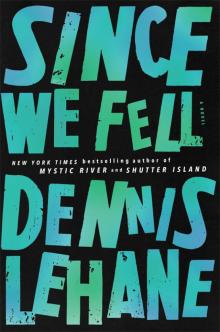 Since We Fell
Since We Fell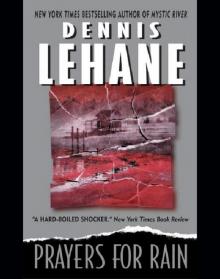 Prayers for Rain
Prayers for Rain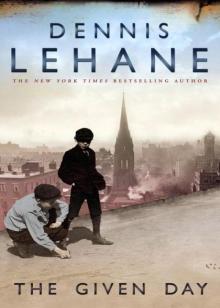 The Given Day
The Given Day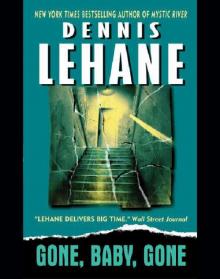 Gone, Baby, Gone
Gone, Baby, Gone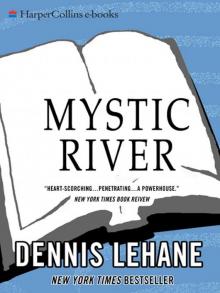 Mystic River
Mystic River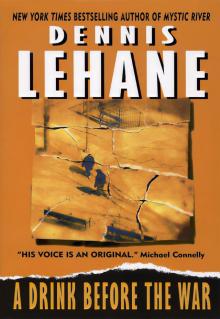 A Drink Before the War
A Drink Before the War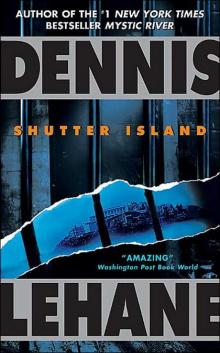 Shutter Island
Shutter Island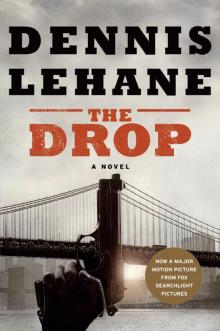 The Drop
The Drop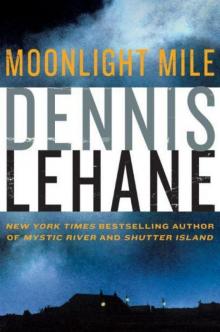 Moonlight Mile
Moonlight Mile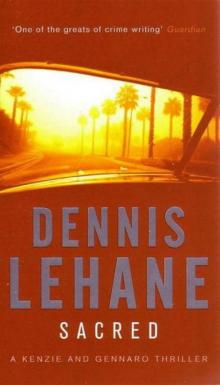 Sacred
Sacred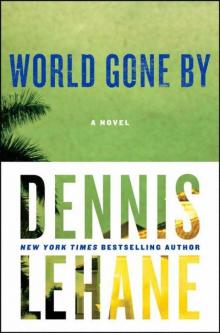 World Gone By
World Gone By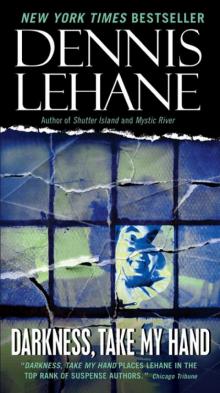 Darkness, Take My Hand
Darkness, Take My Hand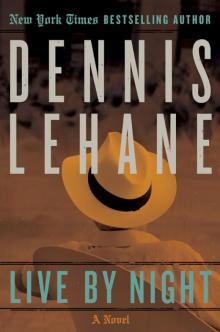 Live by Night
Live by Night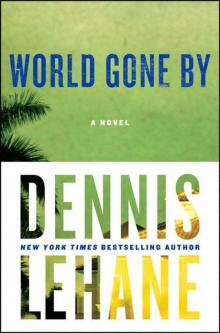 World Gone By: A Novel
World Gone By: A Novel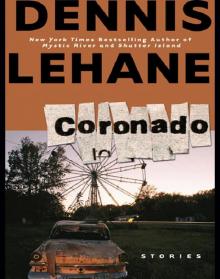 Coronado
Coronado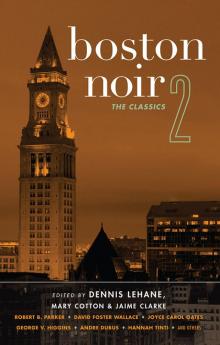 Boston Noir 2
Boston Noir 2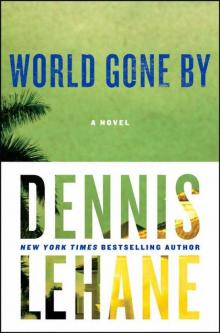 World Gone By: A Novel (Joe Coughlin Series)
World Gone By: A Novel (Joe Coughlin Series)